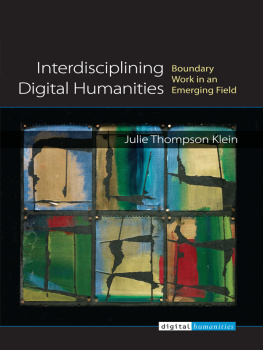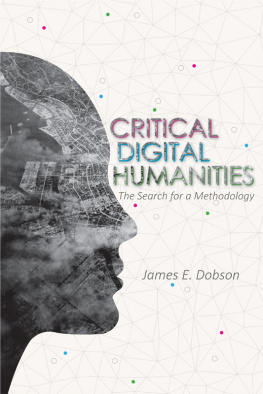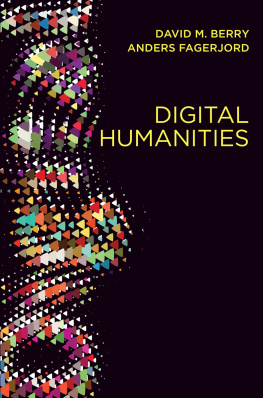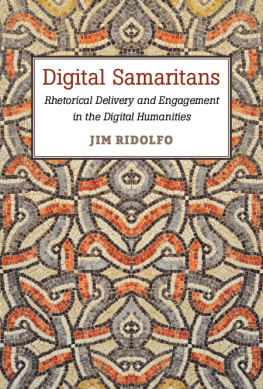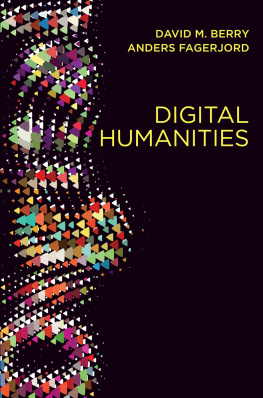Klein - Interdisciplining Digital Humanities: Boundary Work in an Emerging Field
Here you can read online Klein - Interdisciplining Digital Humanities: Boundary Work in an Emerging Field full text of the book (entire story) in english for free. Download pdf and epub, get meaning, cover and reviews about this ebook. year: 2018, publisher: The University of Michigan Press, genre: Politics. Description of the work, (preface) as well as reviews are available. Best literature library LitArk.com created for fans of good reading and offers a wide selection of genres:
Romance novel
Science fiction
Adventure
Detective
Science
History
Home and family
Prose
Art
Politics
Computer
Non-fiction
Religion
Business
Children
Humor
Choose a favorite category and find really read worthwhile books. Enjoy immersion in the world of imagination, feel the emotions of the characters or learn something new for yourself, make an fascinating discovery.
- Book:Interdisciplining Digital Humanities: Boundary Work in an Emerging Field
- Author:
- Publisher:The University of Michigan Press
- Genre:
- Year:2018
- Rating:5 / 5
- Favourites:Add to favourites
- Your mark:
- 100
- 1
- 2
- 3
- 4
- 5
Interdisciplining Digital Humanities: Boundary Work in an Emerging Field: summary, description and annotation
We offer to read an annotation, description, summary or preface (depends on what the author of the book "Interdisciplining Digital Humanities: Boundary Work in an Emerging Field" wrote himself). If you haven't found the necessary information about the book — write in the comments, we will try to find it.
Klein: author's other books
Who wrote Interdisciplining Digital Humanities: Boundary Work in an Emerging Field? Find out the surname, the name of the author of the book and a list of all author's works by series.
Interdisciplining Digital Humanities: Boundary Work in an Emerging Field — read online for free the complete book (whole text) full work
Below is the text of the book, divided by pages. System saving the place of the last page read, allows you to conveniently read the book "Interdisciplining Digital Humanities: Boundary Work in an Emerging Field" online for free, without having to search again every time where you left off. Put a bookmark, and you can go to the page where you finished reading at any time.
Font size:
Interval:
Bookmark:

DIGITAL HUMANITIES
The Digital Humanities series provides a forum for ground-breaking and benchmark work in digital humanities, lying at the intersections of computers and the disciplines of arts and humanities, library and information science, media and communications studies, and cultural studies.
Series Editors:
Julie Thompson Klein, Wayne State University
Tara McPherson, University of Southern California
Paul Conway, University of Michigan
Teaching History in the Digital Age
T. Mills Kelly
Hacking the Academy: New Approaches to Scholarship and Teaching from Digital Humanities
Daniel J. Cohen and Tom Scheinfeldt, Editors
Writing History in the Digital Age
Jack Dougherty and Kristen Nawrotzki, Editors
Pastplay: Teaching and Learning History with Technology
Kevin Kee, Editor
Interdisciplining Digital Humanities: Boundary Work in an Emerging Field
Julie Thompson Klein
DIGITaLCULTUReBOOKS, an imprint of the University of Michigan Press, is dedicated to publishing work in new media studies and the emerging field of digital humanities.
Boundary Work in an Emerging Field
Julie Thompson Klein
University of Michigan Press
Ann Arbor
Copyright by the University of Michigan 2015
Some rights reserved

This work is licensed under the Creative Commons Attribution-Noncommercial-No Derivative Works 3.0 United States License. To view a copy of this license, visit http://creativecommons.org/licenses/by-nc-nd/3.0/ or send a letter to Creative Commons, 171 Second Street, Suite 300, San Francisco, California, 94105, USA.
Published in the United States of America by the University of Michigan Press
Manufactured in the United States of America Printed on acid-free paper
Printed on acid-free paper
2018 2017 2016 2015 4 3 2 1
A CIP catalog record for this book is available from the British Library.
DOI: http://dx.doi.org/10.3998/dh.12869322.0001.001
ISBN 978-0-472-07254-5 (hardcover : alk. paper)
ISBN 978-0-472-05254-7 (pbk. : alk. paper)
ISBN 978-0-472-12093-2 (e-book)
Gail Ryder, who created the cover art, is a graduate of the Masters in Interdisciplinary Studies program at Wayne State University and an Associate Professor of Humanities at Siena Heights University where she teaches liberal arts courses and compositiononline. Bringing her classroom to the virtual world has given her the opportunity to merge a strong interest in the visual arts with her passion for curriculum development. Her newest creation is a course on the Harlem Renaissance. In her spare time, she works on collages, multi-media journals, and one-act plays about the locker room at the local YMCA.
We are by now well into a phase of civilization when the terrain to be mapped, explored, and annexed is information space, and whats mapped is not continents, regions, or acres but disciplines, ontologies, and concepts.
John Unsworth, What is Humanities Computing and What is Not? 2002, http://computerphilologie.uni-muenchen.de/jg02/unsworth.html
Page viCathy N. Davidson
Julie Thompson Klein has written a capaciously definitional book. By that I mean, at this crucial moment in the formation of the many fields that, together, intertwine to be called digital humanities, Klein provides an invaluable guidebook that resists the temptation to restrict and, instead, invites exploration. Interdisciplining Digital Humanities: Boundary Work in an Emerging Field challenges the reader to not only visit the intellectual bounty across, around, and in and about digital humanities, but also helps us to explain its evolution. How did we get here? Where are we now? How far can we go? For an emerging field to become an established field, this work marks a necessary and vital contribution at the right moment.
This book will have many audiences at once and is the rare publication that actually keeps those multiple audiences in mind. Whereas most books that have this level of sophistication do not explain their founding principles, Klein patiently (and provocatively) explicates the basicskeywords, disciplinary inheritances, historical legacies, originating voices. We are never left to feel as if there is a conversation happening and we are not part of it. Rather, by analyzing the deepest assumptions and principles of the field, Klein also brings the reader up to speed, allowing us to run along when she makes her most demanding and expansive case for the way interdisciplinarity forms digital humanities and the way the digital humanities offer a new formation to classic accounts of interdisciplinarity.
This book should be required reading for anyone interested in the digital humanities, beginning student or founding figure. Its appreciations are Page viii wide and original. That means Klein makes the best case for the importance of the field and shows us how some of its most seminal debates, arguments, differences, and disjunctions have, over the last decades now, helped to form its vibrancy, relevance, scope, and impact in the academy and in the more public intellectual work of museums, libraries, and other civic spaces.
To my mind, one of the most important audiences for this book sits on academic committees that judge the quality of work produced within it. Especially for those who make hiring, tenure, and promotion decisions, Interdisciplining Digital Humanities is indispensable. In the academy, we are often called upon to judge the integrity of research outside our own field of expertise. We often rely upon peers we trust for judgment and those peers may or may not carry our own prejudices and predilections as part of their judgments. When a disciplinary boundary is traversed, it can sometimes look, to the more clearly defined disciplinary peer, as if it has been violated, ignored, or, in the case of junior colleagues, not yet been mastered. Klein helps those who do not understand the digital humanities to see how they, in fact, can both contribute vitally to central disciplines and also work through the assumptions at the heart of those disciplines, including methodologically. Digital humanities do so not out of navet but out of the interdisciplines own generic needs. A literary professor doing a close reading of one novel, for example, may not need to know how to use or design algorithms for network analysis; a digital humanist understanding word clustering in 200 nineteenth-century British novels most certainly does. The outcome of this second kind of work may well also be a critical interpretation of texts, but that final analysis is by no means the only part of the process that is of intellectual significance. In the manner of many fields in the quantitative social sciences, the process on the way to the analysis is itself something that needs to be carefully, clearly documented and, in the end, is something also to be evaluated by those determining scholarly contribution.
Klein defines the contours of several fieldsfrom computation to data-driven or Big Data analysis to visualization on the digital or technology side and to the full array of the humanities and interpretive social sciences. More importantly, she shows how, in the digital humanities, it is often the combination of and interplay between and across fields that results in the most exciting workincluding work that requires a meta analysis of the fields themselves.
Font size:
Interval:
Bookmark:
Similar books «Interdisciplining Digital Humanities: Boundary Work in an Emerging Field»
Look at similar books to Interdisciplining Digital Humanities: Boundary Work in an Emerging Field. We have selected literature similar in name and meaning in the hope of providing readers with more options to find new, interesting, not yet read works.
Discussion, reviews of the book Interdisciplining Digital Humanities: Boundary Work in an Emerging Field and just readers' own opinions. Leave your comments, write what you think about the work, its meaning or the main characters. Specify what exactly you liked and what you didn't like, and why you think so.

